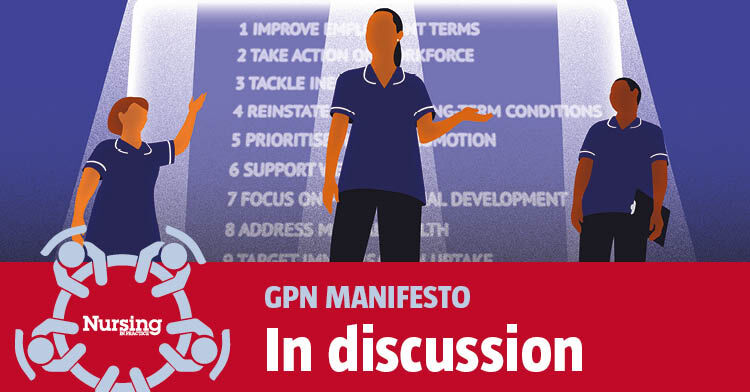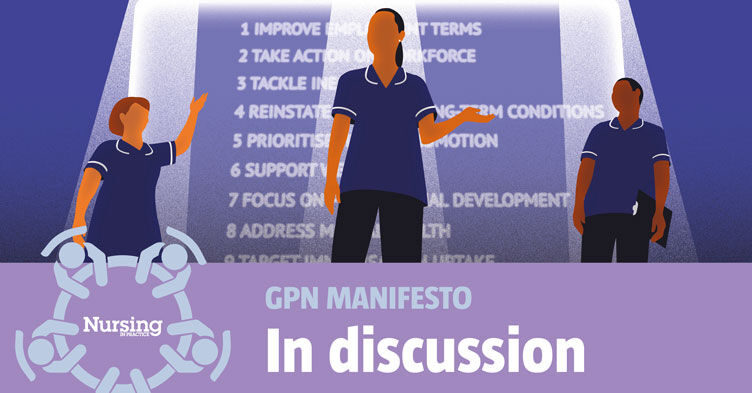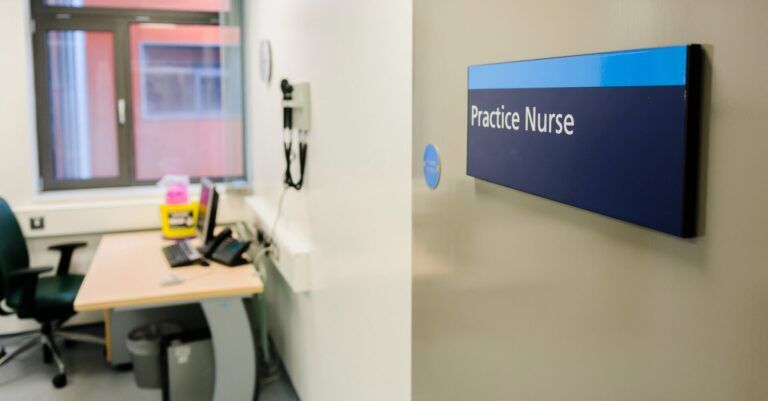We launch the first of 10 points of priorities for general practice nursing for this year, forming a manifesto for the profession. Look out for each of the points as they are published over the coming weeks.
We hear from many general practice nurses (GPNs) who aren’t happy with the direction of travel at their practices or the progress of the profession, so we asked 10 nurses to share their top priorities to create a manifesto for general practice nursing.
Workforce shortages, soaring patient demand, and pay and conditions that fall far short of those on offer to nurses working in secondary care are just some of the ongoing issues faced by GPNs.
Nurses, though, are developing new and innovative ways to respond to these challenges and improve patient care, from a one-stop health shop to tackle health inequalities, to a project to encourage more student nurse placements.
GPNs are making their own recommendations for tackling the difficulties in the sector. Here, within their contributions to the manifesto, nurses share the actions they believe could be taken by practices, PCNs, the wider NHS, the government – and GPNs themselves.
We know that this is only the start of the conversation about challenges in general practice – please join in and share your views if you can.
The ten points of the manifesto will be launched one by one, giving the opportunity for discussion on each point. We will also return to these important topics often during 2024.
Here is the first of the manifesto points, each of which is supported by a nurse working in or closely related to general practice:
#1. Improve employment terms
This manifesto point was championed by Rebecca Corneck
‘The government should ensure general practice nurses have the same pay, terms and conditions as their secondary care colleagues’
Rebecca Corneck is a Queen’s Nurse and a director of general practice nursing for the Southeast London Workforce Development Hub. She also works in general practice one day a week, specialising in diabetes. She is passionate about the inequity of GPN pay, terms and conditions compared with nurses in NHS organisations.
Ms Corneck was one of a group of nurses who wrote to their PCN last year to ask that it mirror the maternity leave conditions received by GP colleagues – a request that has since been met. But there are many more GPNs across the country who only get statutory maternity leave or sick leave – who are only able to take the bare minimum amount of leave, and whose salary is far below that of nurses doing the same work.
GPN pay, terms and conditions ‘is a postcode lottery’, says Ms Corneck. ‘Some practices, for example, pay some nurses £19 an hour, while others pay £12 an hour – so there are massive disparities.’
This is having a major impact on GPN recruitment and retention, she warns. ‘There are nurses who’d love to come into general practice, but simply can’t afford to.’
GPNs are specialist generalists and deserve the same pay, terms and conditions as secondary care colleagues, she says ‘GPNs are very skilled – they see patients from birth to death and play an integral role in their lives.
‘They need recognition, and the security of knowing they are recognised in Agenda for Change terms and conditions. And GPNs need to fight for their worth.’

Rebecca Corneck
Do you have any points for discussion on this topic? Please visit Nursing in Practice on Facebook or X to start the discussion. Please do also get in touch with us at Nursing in Practice if you have relevant projects or ideas for articles to share on this subject. We welcome your thoughts.
The 10 points of the manifesto
Look out for discussion on the points at nursinginpractice.com and on social media as these points are launched one by one over the next few weeks
The government should ensure general practice nurses have the same pay, terms and conditions as their secondary care colleagues.
The NHS, practices, universities and other stakeholders need to change the narrative, to encourage more nurses to choose general practice.
Practices, PCNs, the NHS and government should do more to promote the health of our less well-off families.
#4 REINSTATE TIME FOR LONG-TERM CONDITIONS
Practices and PCNs need to free up time for GPNs to empower patients to manage their long-term conditions, including diabetes, asthma and COPD.
#5 PRIORITISE HEALTH PROMOTION
NHS England, PCNs, and GP practices should ensure GPNs have the time and resources to carry out their crucial role in public health promotion and disease prevention.
GPN employers, PCNs and nursing bodies need to support nurses with their health and care, so they can care for others.
#7 FOCUS ON PROFESSIONAL DEVELOPMENT
All nurses should be given the time for professional development to progress their careers. NHS England, PCNs and practices should encourage and support the GPN and ANP roles to grow in general practice.
It is important for general practice nurses to consider parity of esteem – valuing the patients’ mental health needs equally to their physical health.
GPNs need to play an important role in overturning the decline in childhood immunisation uptake.
General practice needs to continue to evolve to serve patients better, adopting approved digital platforms and applications to improve patient care and outcomes.
Writer: Kathy Oxtoby






